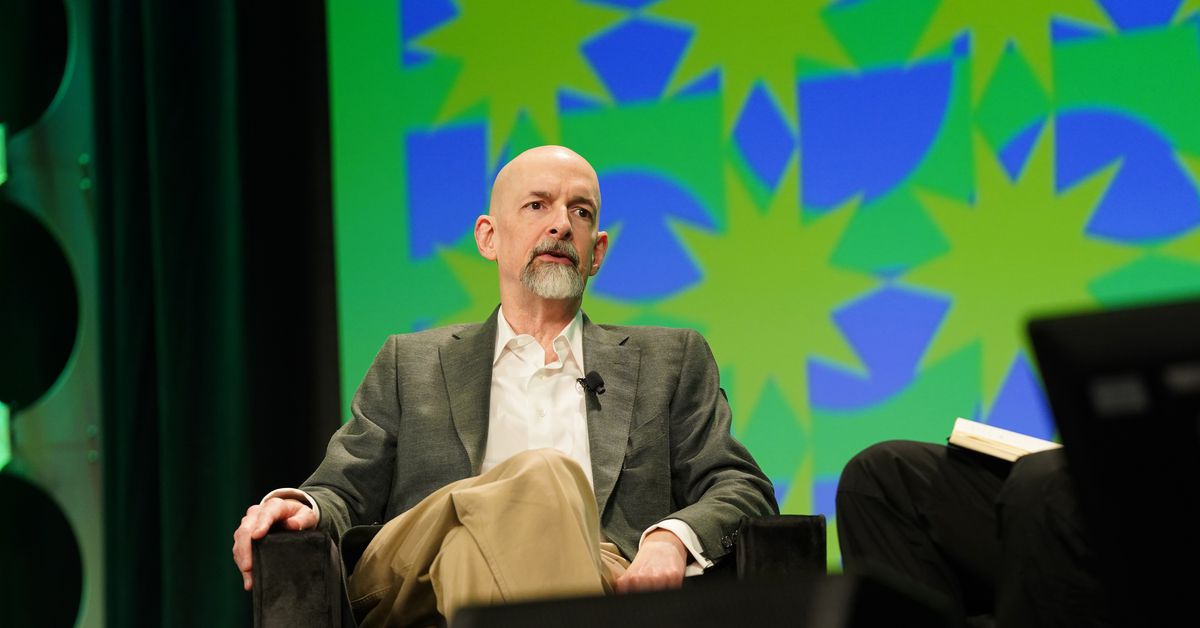[ad_1]
Every science fiction author tries to imagine the future. But very few get what Neal Stephenson is experiencing: Some of the world’s most powerful companies are actively trying to create the future he sketched out three decades ago.
That would be in Snow Crash, the 1992 dystopia/parody he wrote about people who escape the physical world by strapping on goggles and disappearing in the metaverse. Which is now the vision of the world Mark Zuckerberg is actively embracing, both by burning billions on the effort and renaming his company Meta. Apple is also chasing after this idea, and may finally unveil a new headset to make it happen this spring. Microsoft has made a stab at this too — as has Stephenson himself, when he went to work for the hyped-but-fizzled Magic Leap augmented reality startup.
Even if the real-world metaverse doesn’t pan out, Stephenson has had an enormous influence on how we think about tech today. People who’ve never written a line of code love his books — and so do bona fide nerds, like the Google Earth developers who used Snow Crash as inspiration, or Amazon founder Jeff Bezos, who hired Stephenson to work on his Blue Origin rocket startup.
I talked to Stephenson about Snow Crash’s legacy — some of which got auctioned off this week at a Sotheby’s auction — and much more for the Recode Media podcast. We discussed whether the metaverse can exist even if high-end virtual reality goggles never catch on; why he’s never been able to turn his work into a movie, TV show, or game; and his fear of a looming ecological disaster and the science he thinks could solve it.
Here’s an edited excerpt from our chat:
“Holy shit. You know, maybe people are actually taking this seriously.”
Peter Kafka
When did you get a sense that the Jeff Bezoses and Mark Zuckerbergs of the world were really influenced by Snow Crash? That this was really meaningful to tech people who were building things?
Neal Stephenson
I started hearing about it in the mid-90s, as the Internet became a thing. I was on the WELL, which is an early BBS, and there were a lot of tech people there. And so I started getting the idea that it was well-received. I started to hear from people in the tech industry who were reading it, and it gradually became clear. When Google Earth came out [in 2001], word reached me through the grapevine that the Earth application described in Snow Crash had been somewhat inspirational for that. So at that point I was like: “Okay, holy shit. You know, maybe people are actually taking this seriously. “
Peter Kafka
And then cut to [2021] where Zuckerberg renames his company Meta and says, I want to build the metaverse and spend billions of dollars. Did he reach out to you prior to that?
Neal Stephenson
No. And not after either. So there’s been zero communication.
Peter Kafka
Your book, like a lot of science fiction, is describing a dystopia. And it struck a lot of people, including me, as weird that a consumer company, one of the biggest companies in the world with 2 billion users, would say, “This is the future we’re pivoting toward.” What do you make of that?
Neal Stephenson
So, a couple of things. One is, Snow Crash is a dystopian novel, but it’s also kind of a parody of dystopian novels because even then …
Peter Kafka
The main character’s name is “Hiro Protagonist.”
Neal Stephenson
Yeah. And, you know, there had been enough of that kind of literature out there that the tropes had become familiar. And just rehashing them without any self-awareness or humor would have been a little weird. So there’s that. And then the world — the real world — certainly has got its dystopian aspects in that book. But the metaverse itself, I think, is kind of neutral. The first parts of it that we see are kind of garish. And people are playing violent games and there’s lots of ads and tacky crud there. It’s the first thing that meets the eye when you go into the metaverse. But it’s also made clear that there are people like Hiro and Ng who have put a huge amount of effort into making extraordinarily beautiful, detailed houses that they can live in in the metaverse.
Peter Kafka
To me, the striking thing is not so much the metaverse is dystopian but that it’s built to escape a world that is dystopian. We’ve seen that in a bunch of novels. And it just seems like a weird thing to say, “This is the future, we think this is great,” because it implies that the rest of the world is going to fall apart.
Neal Stephenson
Yeah, you’d have to ask him.
“My theory is that a witch placed a curse on me”
Peter Kafka
You previously said you’re “interested in game engines as cultural media for new creative work.” So should I assume that there will be a Neal Stephenson game that I’m going to play at some point?
Neal Stephenson
I’m trying to build something like that. There’s a lot of hoops to jump through first involving rights and financing that are very boring to talk about.
Peter Kafka
Not for me. I nerd out on that stuff.
Neal Stephenson
That’s your deal? Well, it’s part of what we’re calling “the extended Snow Crash universe timeline,” which is sequel/prequel material, basically, to Snow Crash.
Peter Kafka
It sounds like you may not have the rights to make your own book into something.
Neal Stephenson
The rights to the original book are currently controlled by Paramount.
Peter Kafka
Why hasn’t any of your work been turned into a movie, television show, or game? Especially over the last few years when there was so much money being thrown at stuff people could put on streamers. Your work means a lot to a lot of people. It’s established IP. Why hasn’t there been a Neal Stephenson work that I’ve been able to play or watch?
Neal Stephenson
My theory is that a witch placed a curse on me. That’s the current going theory. My producing partner and I refer to what you’ve just described as “the curse.” We’ve been working on trying to break the curse. Currently the leading contender is that there’s some work underway to adapt a book I co-wrote called The Rise and Fall of D.O.D.O. into a television series. It’s still in the early stages, so it’s got a lot of hoops to jump through.
Peter Kafka
But you’ve worked for Jeff Bezos. None of the richest people in the world ever said, “I’m just going to set this up for you. I’m such a mega fan, I’m just going to open up my pocketbook and we’re going to make this thing happen”?
Neal Stephenson
That sounds like a great plan. I like that plan. When you try to implement that plan, sometimes some complications can arise, which again, I can’t get into right now. But, you want smart money. You want people who actually know how to put all the pieces together and produce something. And it is a complicated industry.
Peter Kafka
I was wondering if you were going to say, “Look, up until recently, it’s been impossible technically to make the stuff that I’ve written into something visual or a game, and I didn’t want to do a half-assed version.” I would hate to have seen what a 1997 version of the metaverse looked like.
Neal Stephenson
I’ve had that thought a lot of times. There but for the grace of God.
If someone had done an adaptation of Snow Crash in 1995, they would have said, “What’s the coolest snazzy computer graphics we can get right now and we’ll have that be the metaverse.” And then five years later, people would be looking at it like, “Oh my God, they used to think that was cool-looking.” And I’ve had a few conversations over the decades with people who were investigating adapting Snow Crash and their ideas have changed over time. And at a certain point it flipped over and it became, you know, “We’ll just shoot everything on film because the metaverse would be film-quality graphics for sure. And then we’ll manipulate it, we’ll add digital tweaks, to make it clear that this is the metaverse and not the real world.”
Peter Kafka
How much does it bother you that this has not happened?
Neal Stephenson
You know, be careful what you wish for, I guess. It’s sometimes better to have the aspiration of something than to face some of the compromises that may happen when it really materializes. But I don’t lose sleep over it because I can still write novels.
It’s much more frustrating if you’re a film director or a screenwriter and you can’t get stuff made. You need other people to mobilize huge amounts of capital to make that real. There’s a weird way in which novelists — even broke novelists — have got a kind of status in that world that is very high status because they have creative control.
Peter Kafka
You make the thing exactly the way you want it to be.
Neal Stephenson
Yeah. I can remember, way back in the ’80s, I was talking to screenwriters who had been hired to adapt some of my work. They’re driving Porsches around Beverly Hills. I’m starving. But they would come to me and say, “How did you become a writer? How could I become a novelist?” Because in their mind, status isn’t money, it’s creative control. And they wanted that kind of status.
Peter Kafka
You can’t pay your rent with status.
Neal Stephenson
Yeah. Well, that’s true.
“The metaverse initially is going to be experienced by almost everyone on a flat screen”
Peter Kafka
Do you think in the future — assuming the tech gets there and assuming there’s a reason to use it, which are both huge things — that humans are going to want to wear AR/VR goggles? I went to the new Avatar a couple months ago and it’s a three-hour movie and I was seeing it in IMAX with the [3-D] headset on. And an hour and a half in, I was like, “I don’t want to wear these goggles anymore.”
Neal Stephenson
You hit your limit. There’s a semantic distinction between glasses and goggles. Lots of people wear glasses all day and nobody thinks twice about it. Very few people wear goggles all day. You go skiing, maybe you’ll put on goggles. Fighter pilots wear goggles, but goggles are not generally a long-term wear kind of item. And no matter how good the experience is, wearing that stuff for, as you say, more than 45 minutes or an hour is not enjoyable for a lot of people.
On the other hand, the game industry has taught everyone to experience 3D worlds through a rectangle — a flat rectangular screen — and it works great. You’re using your keyboard and your mouse or whatever your control system is. And people just fluently pick that up and they’ll play that for hours. So I think that goggles are going to be a thing. I like goggles. I know people who make goggles of various types, and I can’t wait to see what comes out of that industry. But I think that most people are going to continue experiencing 3D worlds most of the time through screens.
Peter Kafka
And does the metaverse work if it’s a flat-screen experience for those people?
Neal Stephenson
Totally. I keep forgetting to mention this but in my view, the metaverse initially is going to be experienced by almost everyone on a flat screen.
Peter Kafka
A television set or iPhone.
Neal Stephenson
Yeah, some version of that. Because that’s just that’s the reality. That’s what the market is.
“The only things worth talking about right now are carbon and the fracturing of society by social media”
Peter Kafka
You imagine the future for a living. Are you optimistic or pessimistic?
Neal Stephenson
So I think that the only two things worth talking about right now are carbon and the fracturing of society by social media. They’re both equally concerning. I don’t know what to do about social media. I’m not a people person, in a lot of ways. So I tend to think about carbon. I’ve been thinking a lot about carbon, carbon sequestration in particular, geoengineering, all that stuff.
Peter Kafka
Getting the carbon emissions out of there.
Neal Stephenson
How do we reduce carbon emissions and remove the hundreds of billions of kilograms of carbon that we’ve already put into the air? I think we’ll beat that problem. But I think it’s going to be the biggest engineering project in human history. It’s going to transform the world — the built environment — because we simply can’t do it without doing engineering on a massive scale. I think we’ll succeed at it. But we’ll have some bad times between now and then.
I think we’ll start to see the kinds of mass casualty events that are described in Kim Stanley Robinson’s book, The Ministry for the Future, where you might see millions of people dying of heat stroke in a certain area over a very short period of time. When the temperature goes up, the humidity goes up, the power goes out. And when that kind of stuff starts happening — which I sadly think it will in the next decade — it’s going to have incredibly powerful political ramifications.
Peter Kafka
I was going to say we’re ending this [conversation] with cautious optimism, but I don’t know if I can call it that.
Neal Stephenson
I hope that stuff doesn’t happen, but I think even the threat of it is going to lead, eventually, to people taking action.
[ad_2]
Source link





